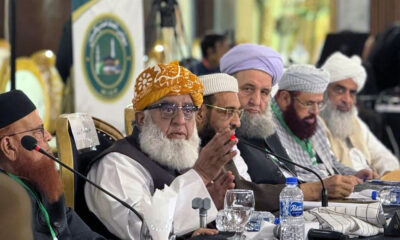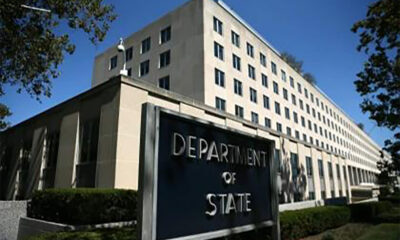Science & Technology
N. Korean satellite plunges into sea after rocket failure
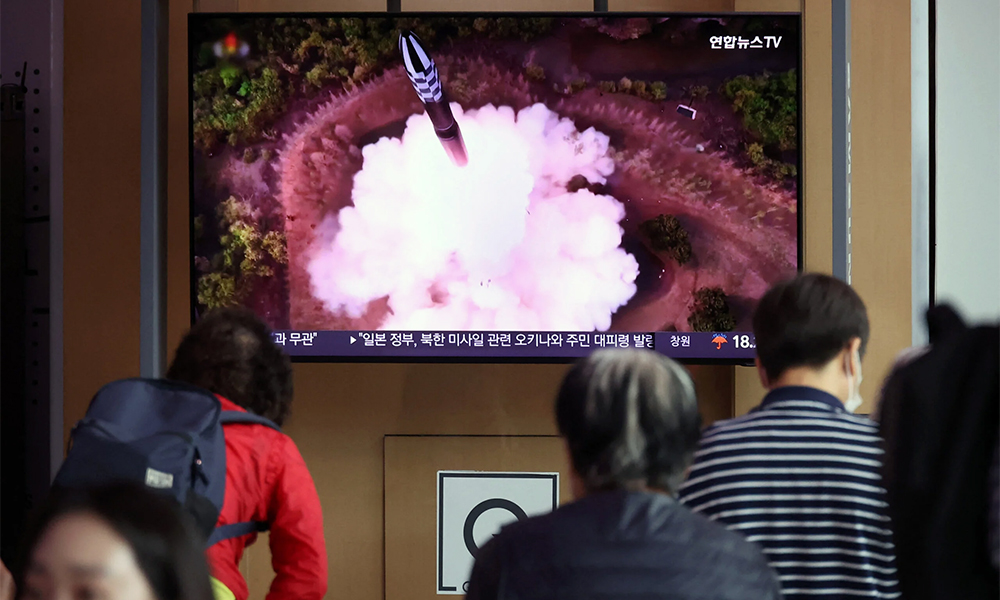
A North Korean satellite launch on Wednesday ended in failure, sending the booster and payload plunging into the sea, North Korean state media said, and the South’s military said it had recovered parts of the launch vehicle, Reuters reported.
The new “Chollima-1” satellite launch rocket failed because of instability in the engine and fuel system, state news agency KCNA reported.
The flight was the nuclear-armed state’s sixth satellite launch attempt, and the first since 2016. It was supposed to put North Korea’s first spy satellite in orbit.
It prompted emergency alerts and brief evacuation warnings in parts of South Korea and Japan. The notices were withdrawn with no danger or damage reported.
South Korea’s Joint Chiefs of Staff said on Wednesday the military was conducting a salvage operation to recover what is believed to be parts of the space launch vehicle. The military shared pictures of debris pulled from the water.
Officials from the United States, Japan, South Korea held a phone call, where they “strongly condemned” the launch, Japan’s foreign ministry said.
“The three countries will stay vigilant with high sense of urgency”, the statement said.
North Korea had said it would launch its first military reconnaissance satellite between May 31 and June 11 to boost monitoring of U.S. military activities.
South Korea last week placed satellites in orbit with a domestically designed and produced rocket for the first time, and China sent three astronauts to its space station as part of crew rotation on Tuesday, read the report.
The rocket plunged into the sea “after losing thrust due to the abnormal starting of the second-stage engine,” KCNA reported, in an unusually candid admission of a technical failure by the North.
Pyongyang’s National Aerospace Development Administration (NADA) will investigate the “serious defects” and take action to overcome them before conducting a second launch as soon as possible, KCNA said.
In data provided to international authorities, North Korea said the launch would carry the rocket south, with stages and other debris expected to fall over the Yellow Sea and into the Pacific Ocean.
Air raid sirens wailed across the South Korean capital of Seoul about 6:32 a.m. (2132 GMT Tuesday) as the city warned citizens to prepare for a potential evacuation. Later alerts said the city warning had been a mistake.
“I was so panicked. Nine-one-one lines were busy and the internet was slow,” said Lee Juyeon, 33, a resident in the city of 9 million who was preparing to shelter in a basement with her young child before learning it was a false alarm.
Calm quickly returned in Seoul, while South Korean stocks (.KS11) and the won currency traded firmer.
The Japanese government also issued an emergency warning over its J-Alert broadcasting system for residents of the southern prefecture of Okinawa to take cover indoors early on Wednesday morning.
It later said the rocket would not fly into Japanese territory and lifted the warnings.
On Tuesday, Ri Pyong Chol, vice-chairman of the Central Military Commission of North Korea’s ruling Workers’ Party, said ongoing joint military exercises by the U.S. and South Korea required Pyongyang to have the “means capable of gathering information about the military acts of the enemy in real time.”
The White House condemned a launch using ballistic missile technology and said in a statement it was assessing the situation in coordination with allies, Reuters reported.
Japan’s Chief Cabinet Secretary Hirokazu Matsuno said North Korea’s rocket disappeared from radar above the Yellow Sea and did not make it into space, and added the government had no further information to share now.
“We strongly condemn North Korea’s actions,” he said. Tokyo lodged a complaint to Pyongyang through diplomatic channels in Beijing, he said.
Before Wednesday’s launch, the U.S. State Department said any North Korean launch that used ballistic missile technology would violate multiple United Nations Security Council resolutions.
“Space launch vehicles (SLVs) incorporate technologies that are identical to, and interchangeable with, those used in ballistic missiles, including intercontinental ballistic missiles,” a State Department spokesperson said.
North Korea has attempted five other satellite launches, with two placed in orbit, including during its last such launch in 2016. Its capacity for constructing working satellites remains unproven, however, analysts say.
“To the best of our knowledge, North Korea has a very limited capacity to build satellites,” said Brian Weeden of the Secure World Foundation, a U.S.-based space policy and security organisation. “They have launched a couple of satellites before, but all of them failed immediately after launch or shortly thereafter and none of them appeared to have any significant capability.”
Science & Technology
Australia social media ban set to take effect, sparking a global crackdown
For the social media businesses, the implementation marks a new era of structural stagnation as user numbers flatline and time spent on platforms shrinks, studies show.

Australia is set to become the first country to implement a minimum age for social media use on Wednesday, with platforms like Instagram, TikTok and YouTube forced to block more than a million accounts, marking the beginning of an expected global wave of regulation.
From midnight, 10 of the biggest platforms will be required to block Australians aged under 16 or be fined up to A$49.5 million ($33 million), Reuters reported.
The law received harsh criticism from major technology companies and free speech advocates, but was praised by parents and child advocates.
The rollout closes out a year of speculation about whether a country can block children from using technology that is built into modern life. And it begins a live experiment that will be studied globally by lawmakers who want to intervene directly because they are frustrated by what they say is a tech industry that has been too slow to implement effective harm-minimisation efforts.
Governments from Denmark to Malaysia – and even some states in the U.S., where platforms are rolling back trust and safety features – say they plan similar steps, four years after a leak of internal Meta (META.O) documents showed the company knew its products contributed to body image problems and suicidal thoughts among teenagers while publicly denying the link existed.
“While Australia is the first to adopt such restrictions, it is unlikely to be the last,” said Tama Leaver, a professor of internet studies at Curtin University.
“Governments around the world are watching how the power of Big Tech was successfully taken on. The social media ban in Australia … is very much the canary in the coal mine.”
A spokesperson for the British government, which in July began forcing websites hosting pornographic content to block under-18 users, said it was “closely monitoring Australia’s approach to age restrictions.”
“When it comes to children’s safety, nothing is off the table,” they added.
Few will scrutinise the impact as closely as the Australians. The eSafety Commissioner, an Australian regulator tasked with enforcing the ban, hired Stanford University and 11 academics to analyse data on thousands of young Australians covered by the ban for at least two years.
Though the ban covers 10 platforms initially, including Alphabet’s (GOOGL.O), YouTube, Meta’s Instagram and TikTok, the government has said the list will change as new products appear and young users switch to alternatives.
Of the initial 10, all but Elon Musk’s X have said they will comply using age inference – guessing a person’s age from their online activity – or age estimation, which is usually based on a selfie. They might also check with uploaded identification documents or linked bank account details.
Musk has said the ban “seems like a backdoor way to control access to the internet by all Australians” and most platforms have complained that it violates people’s right to free speech.
For the social media businesses, the implementation marks a new era of structural stagnation as user numbers flatline and time spent on platforms shrinks, studies show.
Platforms say they don’t make much money showing advertisements to under-16s, but they add that the ban interrupts a pipeline of future users. Just before the ban took effect, 86% of Australians aged 8 to 15 used social media, the government said.
“The days of social media being seen as a platform for unbridled self-expression, I think, are coming to an end,” said Terry Flew, the co-director of University of Sydney’s Centre for AI, Trust and Governance.
Platforms responded to negative headlines and regulatory threats with measures like a minimum age of 13 and extra privacy features for teenagers, but “if that had been the structure of social media in the boom period, I don’t think we’d be having this debate,” he added.
Science & Technology
Ethiopian volcano erupts for first time in nearly 12,000 years
Ash from the eruption drifted across the region, spreading over Yemen, Oman, India, and parts of Pakistan.
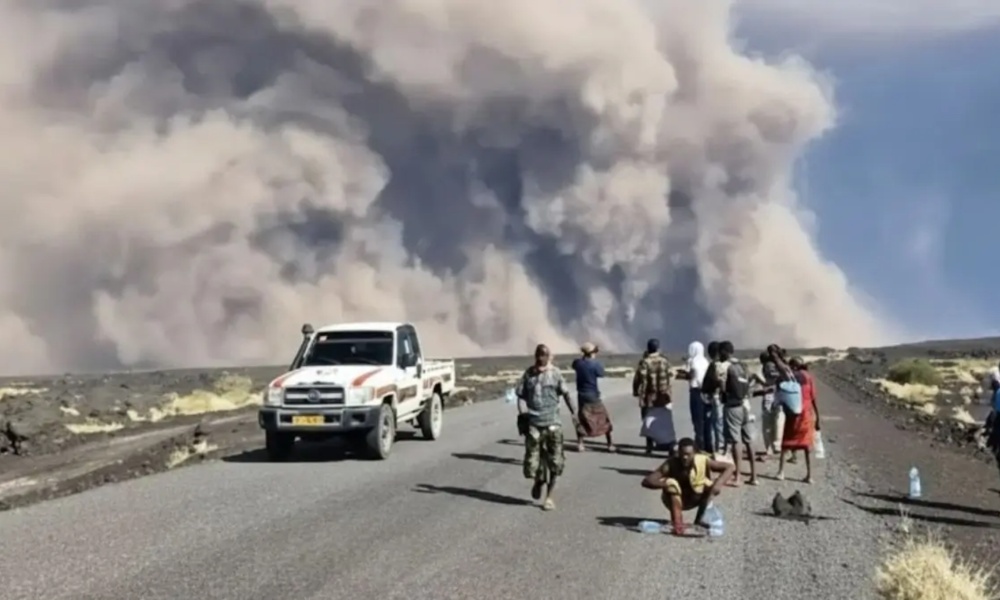
The Hayli Gubbi volcano in Ethiopia’s Afar region has erupted for the first time in almost 12,000 years, sending massive ash plumes soaring up to 14 kilometres into the atmosphere, according to the Toulouse Volcanic Ash Advisory Centre.
The eruption began on Sunday and lasted several hours. Hayli Gubbi, located around 800 kilometres northeast of Addis Ababa near the Eritrean border, sits within the geologically active Rift Valley, where two major tectonic plates meet. The volcano rises roughly 500 metres above the surrounding landscape.
Ash from the eruption drifted across the region, spreading over Yemen, Oman, India, and parts of Pakistan. Satellite imagery and social-media videos captured a towering column of white smoke billowing into the sky.
The Smithsonian Institution’s Global Volcanism Program notes that Hayli Gubbi has no recorded eruptions during the Holocene, the period dating back about 12,000 years to the end of the last Ice Age.
Volcanologist Simon Carn of Michigan Technological University also confirmed on Bluesky that the volcano had “no record of Holocene eruptions.”
Science & Technology
Cloudflare outage easing after millions of internet users affected
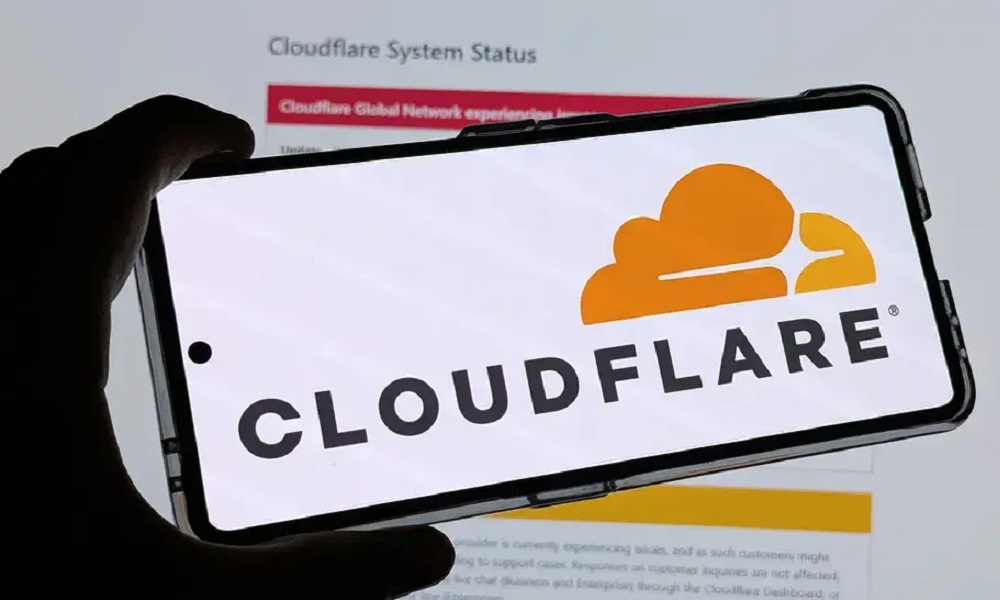
A global outage at web-infrastructure firm Cloudflare began to ease on Tuesday afternoon after preventing people from accessing major internet platforms, including X and ChatGPT.
Cloudflare, whose network handles around a fifth of web traffic, said it started to investigate the internal service degradation around 6:40 a.m. ET. It has deployed a fix but some customers might still be impacted as it recovers service.
The incident marked the latest hit to major online services. An outage of Amazon’s cloud service last month caused global turmoil as thousands of popular websites and apps, including Snapchat, were inaccessible due to the disruption.
Cloudflare – whose shares were down about 5% in premarket trading – runs one of the world’s largest networks that helps websites and apps load faster and stay online by protecting them from traffic surges and cyberattacks.
The latest outage prevented users from accessing platforms such as Canva, X, and ChatGPT, prompting users to log outage reports with Downdetector.
Downdetector tracks outages by collating status reports from a number of sources. “We saw a spike in unusual traffic to one of Cloudflare’s services beginning at 11:20 UTC. That caused some traffic passing through Cloudflare’s network to experience errors,” the company said in an emailed statement.
“We are all hands on deck to make sure all traffic is served without errors.”
X and ChatGPT-creator OpenAI did not immediately respond to requests for comment. – REUTERS
-

 Latest News2 days ago
Latest News2 days agoAfghanistan signs 30-year deal for marble mining in Daikundi
-

 Latest News4 days ago
Latest News4 days agoAfghan border forces prevent illegal entry of hundreds into Iran
-

 Latest News3 days ago
Latest News3 days agoPakistan summons Afghan diplomat over deadly attack in North Waziristan
-

 Latest News3 days ago
Latest News3 days agoAfghan health minister calls for medical cooperation between Kabul and New Delhi
-

 Latest News4 days ago
Latest News4 days agoJapan allocates nearly $20 million in humanitarian aid for Afghanistan
-

 Latest News3 days ago
Latest News3 days agoKarzai urges reopening of girls’ schools and universities for Afghanistan’s bright future
-

 Business5 days ago
Business5 days agoAfghanistan-Kazakhstan banking ties discussed in Kabul meeting
-
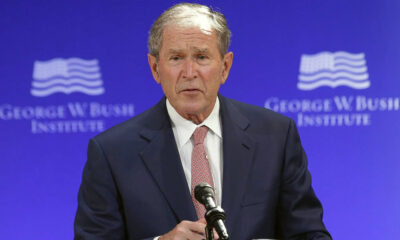
 Latest News2 days ago
Latest News2 days agoBush Institute criticizes Trump administration’s Afghan immigration freeze


